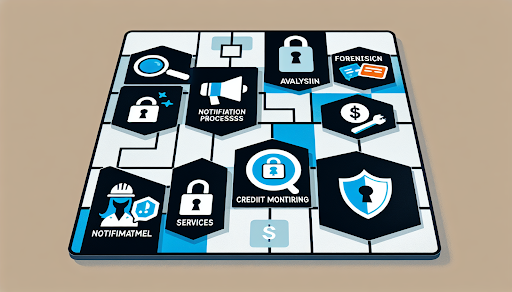As cyber-attacks escalate in frequency and severity, cyber insurance has become an essential layer of protection for your business’s finances. This guide demystifies cyber insurance, offering guidance in choosing the right policy to ensure your company is resilient in the face of such adversity.
Understanding Cyber Insurance: Key Concepts
As the 21st century approached and businesses moved towards online platforms, a new form of insurance was created to address cyber risks, cyber insurance. This type of coverage serves as a financial safety net for digital threats, particularly those related to internet-based attacks and crimes like data breaches and cyber-attacks.
These policies are specifically designed to provide protection against expenses incurred from cybersecurity incidents that impact information governance and IT infrastructure. Cyber liability insurance policies can offer coverage for various types of online dangers such as hacking attempts, extortion schemes, thefts or data destruction.
Having a policy that includes both general cyber liability insurance and specific coverage for cyber events can be crucial in safeguarding businesses from the technology-related attacks. With adequate protection provided by a coverage plan, businesses can rest assured that they have proper defense against potential damage. So we highly recommended businesses obtain comprehensive cyber insurance. It offers a vital lifeline for companies confronted with various forms of of financial loss due to theft or other online crimes stemming from cyberattacks.
Cyber Liability Insurance
Imagine this scenario. Your company falls victim to a severe cyber attack that exposes sensitive customer data. This could potentially lead to legal action and expensive penalties. In such situations, having cyber liability insurance is crucial. This specialized type of insurance protects against financial losses caused by various types of cyber events including but not limited to data breaches, viruses, hacking attempts, and even extortion.
Cyber liability insurance acts as an essential shield for your business during a storm, providing coverage for everything from legal costs incurred due to the attack and potential regulatory fines.
Types of Cyber Insurance Coverage
Cyber insurance does not take a one-size-fits-all approach, but rather adapts to the unique needs of each business. The majority of policies offer two main types of coverage: first-party and third-party.
- First-party coverage is geared towards protecting the policyholder in case they experience losses or incur expenses due to a cyber incident.
- In contrast, third-party coverage comes into play if there are legal implications for data protection negligence and can assist with litigation defense costs. Together, these forms of coverage provide comprehensive protection against an array of potential cyber risks.
Assessing Your Business’s Cyber Risk


Having a thorough understanding of your company’s cyber risk is essential. Cybersecurity threats, ranging from ransomware to phishing attacks, can pose significant challenges for businesses of all sizes. These risks go beyond technical disruptions as they have the potential to damage customer trust and harm brand reputation while causing financial instability.
To effectively manage cybersecurity risk and make informed decisions about appropriate coverage through policies such as cyber insurance, it is crucial to identify critical assets within your organization, evaluate vulnerabilities present in its systems and processes constantly assess evolving cyber threats.
Identifying Vulnerabilities
The strength of a network’s defenses is dependent on its most vulnerable components. These components can include unfixed software flaws, weak passwords, and exposed ports. To maintain network security, it is crucial to regularly scan for and address these vulnerabilities.
With an organization’s widespread presence and growing trend towards remote work comes an increased risk exposure which calls for additional cybersecurity measures. As such, it remains vital to prioritize maintaining effective network security protocols in order to protect against potential threats.
Calculating Potential Losses
Imagine a cyber attack like a tempest, leaving destruction and chaos in its wake. Once the storm has passed, it’s time to assess the damage and calculate financial losses. This is where forensic accounting teams play an essential role – analyzing business operations, determining when the loss occurred, and estimating net sales and saved expenses.
According to statistics from 2021, data breaches have resulted in significant costs for companies mainly due to lost business opportunities which averaged $1.59 million per incident.
Essential Components of Cyber Insurance Policies


A robust cyber insurance policy is like a well-stocked first-aid kit, equipped to address various issues. These policies offer financial protection against losses caused by electronic data breaches, cyberattacks and other cybersecurity concerns. They cover expenses such as legal fees and penalties that may result from these events.
An all-inclusive policy should be tailored to the specific risks faced by your company, including ransomware attacks and data breaches. Some policies also provide betterment coverage which helps businesses fund necessary improvements in their computer systems following a breach in order to prevent future vulnerabilities.
Data Breach Response
Data breaches can occur unexpectedly and create a state of chaos. In such situations, cyber insurance policies are essential as they cover direct expenses associated with the breach. This includes notifying affected parties, conducting forensic analysis to understand the extent of damage, and compensating for lost income caused by disruptions in business operations.
Some policies may take care of hiring PR agencies to manage any harm done to reputation and providing credit monitoring services for individuals whose personal information has been compromised.
Network Security Failure
The consequences of network security failures can be catastrophic, making them urgent issues to address. To handle the costs resulting from such failures, it is crucial for cyber insurance policies to include first-party coverage that specifically addresses network security.
This type of coverage encompasses expenses related to restoring damaged computer programs and electronic data caused by events such as malware attacks or other cyber-related incidents. As one of the key aspects to consider when selecting a policy, adequate network security coverage ensures protection against potential financial losses due to breaches and damages in this digital age.
Business Interruption
Imagine your company’s operations coming to an unexpected halt because of a cyber attack. The financial consequences could be devastating. Cyber insurance with business interruption coverage can serve as a crucial safety net, covering expenses and lost income resulting from computer system impairment caused by events like viruses or denial-of-service attacks.
Certain policies may also offer extended coverage for the aftermath of fully restoring systems, assisting businesses in meeting ongoing additional costs.
Navigating Cyber Insurance Exclusions
Every cyber insurance policy, like any set of rules, has its own exceptions. These are particular scenarios in which coverage does not apply and may include incidents that happened before a specific retroactive date, losses related to war or terrorism, and exclusions based on contractual liability.
To effectively protect critical systems with adequate coverage, it is important to understand the triggering events for policy activation and stay informed about any potential exclusions.
Preventable Issues and Human Error
In the realm of cyber insurance, it is crucial to prioritize honesty. Failing to reveal existing vulnerabilities or ongoing cyberattacks before securing a policy can result in rejected claims and coverage exclusions.
This emphasizes the importance of openness and precise disclosure for ensuring continuous coverage.
Intellectual Property Theft
Even though cyber insurance policies offer extensive protection against various risks, they usually do not include coverage for intellectual property theft. This is considered a unique risk that is typically excluded from standard cyber insurance plans.
Businesses dealing with valuable intellectual property may need to invest in specialized coverage options to safeguard themselves against potential losses caused by IP theft.
Choosing the Right Cyber Insurance Policy for Your Business


As with any investment in your business, there are a lot of considerations. Working with a broker for these decisions is in your best interest. They’ll help you ensure you have the right coverage and provider for your unique needs. Here are a few of the items a broker will help you navigate.
- Tailored Coverage: Align with your specific risks and industry (don’t settle for generic!).
- Expert Provider: Choose one with industry experience and a proven track record in your business size range.
- Streamlined Claims: Ensure a clear, efficient process for minimal disruption during incidents.
- Strong Security: Implement robust practices (training, updates) to potentially lower premiums.
- Collaboration: Partner with an experienced broker to craft a policy based on your size, risk, and budget.
The Cost of Cyber Insurance: Factors and Pricing
The cost of cyber insurance can varies widely. Multiple factors play a role in determining the price, including your company’s incident prevention abilities, annual revenue and the number of unique records containing personally identifiable information.
As industry trends show an increase in frequency of cyber attacks and a widening range for potential targets as well as constantly evolving techniques used by adversaries, there is also a noticeable impact on rising premiums for cyber insurance coverage.
Following are the factors that impact costs.
Company Size and Industry
The cost and terms of your cyber insurance policy can be affected by the size of your company. Bigger companies usually need more extensive policies because they have a larger number of devices, users, and systems. Certain industries that are highly vulnerable to cyberattacks like public administrations, technology firms, and healthcare providers tend to have higher-priced policies due to the increased risks and associated expenses.
Security Measures and Risk Management
In the same way that keeping your home in good condition can lower your insurance costs, maintaining a strong security stance can decrease cyber insurance expenses. Utilizing cybersecurity measures such as endpoint protection and multi-factor authentication, and regularly practicing sound cyber hygiene habits may lead to decreased premiums for cyber insurance.
Insurance companies typically offer more favorable policies with lower rates to businesses that show evidence of robust security procedures.
Summary
As the world becomes increasingly digital, cyber insurance has become a vital form of protection. It serves as a safety net for financial losses caused by various types of cyber threats such as data breaches, network security failures, and even business interruptions. It should complement existing security measures in place. As cybersecurity risks continue to evolve rapidly, having cyber insurance is an important piece in safeguarding one’s business against these threats.
Frequently Asked Questions
- Is cyber protection insurance worth it?
- Having cyber protection insurance is valuable as it can reduce the impact of data breaches or phishing attempts on a business and offer financial coverage in case of a ransomware incident, ultimately minimizing any potential disruptions.
- What does cybercrime insurance cover?
- A cybercrime insurance policy provides coverage for a company’s responsibility in the event of a data breach that compromises sensitive customer information and any resulting economic losses due to network security failures. It can also offer financial protection for expenses related to dealing with such incidents, including legal fees, notification costs, and implementing credit monitoring measures.
- What isn’t covered by cyber insurance?
- Cyber insurance typically doesn’t cover potential future lost profits or the theft of intellectual property. Additionally, it does not cover compliance fines, cyber crimes involving employees, incidents due to weak in-house cybersecurity, or repair of damaged hardware.
- What is cyber tech insurance?
- Cyber liability insurance, also referred to as cyber tech insurance, provides protection for your organization against data breaches and other cybersecurity concerns. This type of coverage assists in covering expenses associated with investigating and recovering from potential attacks or breaches.
- Having this form of insurance is crucial for companies that are vulnerable to cyber risks. It serves as a safety net in case any security issues arise involving sensitive information or systems within the business. With cyber liability coverage.
- What is cyber insurance?
- Cyber insurance is a type of protection that aids in mitigating potential financial liabilities associated with conducting activities on the internet. It provides coverage for expenses incurred as a result of cyber events that affect computer systems and information management protocols.

